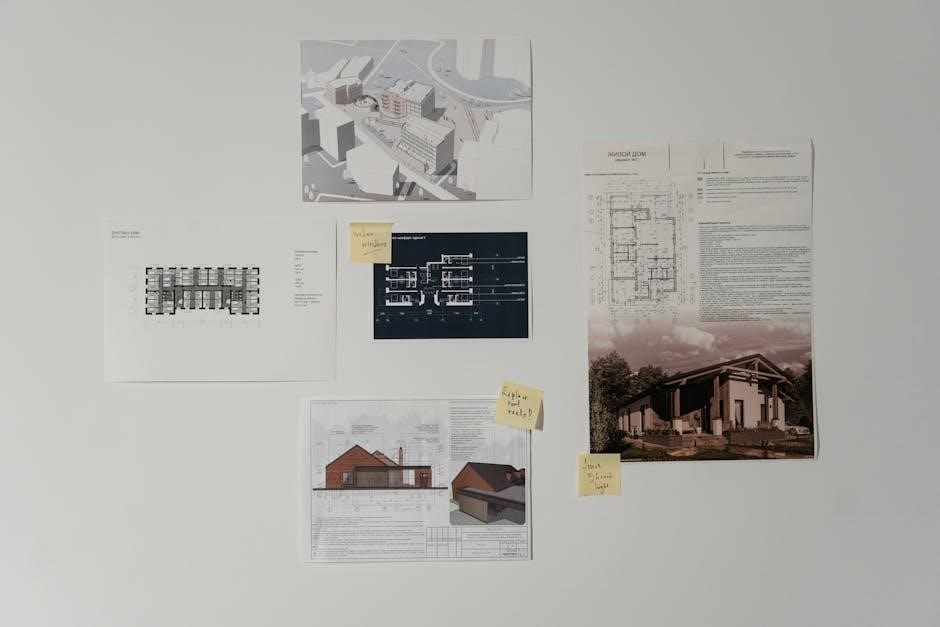
advanced diploma of civil construction design skill assessment requirement pdf
The Advanced Diploma of Civil Construction Design equips professionals with specialized skills in civil engineering, focusing on design, project management, and structural analysis, aligning with industry standards.
1.1 Overview of the Qualification
The Advanced Diploma of Civil Construction Design is a comprehensive qualification that equips individuals with specialized skills in civil engineering design, project management, and structural analysis. It is recognized under the Australian Qualifications Framework (AQF) as a Diploma-level qualification, focusing on practical and theoretical knowledge required for designing infrastructure projects; This qualification is tailored for professionals seeking to enhance their expertise in civil construction, including roles like civil engineering draftspersons or construction project managers. It covers key areas such as design principles, site planning, and compliance with industry standards, ensuring graduates are prepared for real-world challenges in the construction sector.
1.2 Importance of Skill Assessment in Civil Construction Design
Skill assessment is crucial for ensuring that professionals in civil construction design meet industry standards and regulatory requirements. It validates both academic qualifications and practical experience, ensuring competency in design principles, project management, and compliance with safety protocols. For migration purposes, a positive skill assessment is mandatory for obtaining visas, as it confirms the applicant’s ability to contribute effectively to Australia’s construction sector. This evaluation process also bridges gaps between international qualifications and Australian standards, fostering a skilled workforce capable of delivering high-quality infrastructure projects.
Eligibility Criteria for Skill Assessment
Eligibility requires an Advanced Diploma or higher in a relevant field, with qualifications comparable to AQF standards, and demonstrated work experience in civil construction design.
2.1 Academic Qualifications Required
Australian qualifications such as an Advanced Diploma or Associate Degree in engineering are required, aligning with AQF standards. These qualifications must be in a field relevant to civil construction design, such as civil engineering or a closely related discipline. The qualification must demonstrate equivalence to an AQF Diploma or higher and align with the nominated occupation under ANZSCO standards. For international applicants, qualifications must be assessed for comparability to Australian standards. The academic credentials must be recognized and authenticated, ensuring they meet the specific requirements for skills assessment in civil construction design. This ensures the qualification is valid for migration purposes.
2.2 Work Experience Requirements
Relevant work experience is crucial for skill assessment in civil construction design. Applicants typically need at least one year of post-study work experience in a related field. This experience should demonstrate practical application of skills in roles such as civil engineering draftsperson or construction design. The work must be directly related to the nominated occupation and align with the Advanced Diploma’s outcomes. Both paid and unpaid experiences are considered, provided they meet the skill and occupational relevance criteria; Detailed documentation, including employer references and project involvement, is required to validate the experience during the assessment process. This ensures the applicant’s competency aligns with industry standards.
Required Documents for Skill Assessment
- CV/Resume: A detailed summary of education, work experience, and skills relevant to civil construction design.
- Academic Certificates: Verified copies of your Advanced Diploma or equivalent qualifications.
- Work Experience Proof: Letters from employers confirming your role, duration, and responsibilities.
3.1 CV/Resume Summary
Your CV/Resume must provide a comprehensive overview of your education, work experience, and technical skills relevant to civil construction design. It should detail your role in projects, responsibilities, and achievements. Include specific software proficiency, such as CAD or structural analysis tools. Highlight any leadership or teamwork experiences that demonstrate your capability in managing or contributing to civil engineering projects. Ensure the CV is professionally formatted, clear, and concise, aligning with the skills and knowledge required for the Advanced Diploma; Tailor your CV to emphasize qualifications and experiences directly related to civil construction design to support your skill assessment application effectively.

3.2 Academic Degree Certificates
Academic degree certificates are essential for skill assessment in civil construction design. Submit certified copies of your diploma or degree, ensuring they are issued by recognized institutions. For international qualifications, verify if they align with the Australian Qualifications Framework (AQF) Diploma level or higher. Engineering Australia may require additional assessments for overseas degrees. Include official transcripts and any equivalency certificates if applicable. Ensure all documents are translated into English by accredited translators if necessary. These certificates validate your educational background and form a critical part of the skill assessment process for migration purposes.

3.3 Proof of Work Experience
Proof of work experience is a crucial component of the skill assessment process. Submit detailed employment letters, payslips, and project involvement documents to demonstrate your practical skills. Clearly outline your role, responsibilities, and duration of employment in the civil construction or engineering field. For self-employed individuals, provide contracts, invoices, and witness statements. Ensure all documents are certified and include third-party verification. Relevant work experience must align with the nominated occupation and demonstrate competency in civil construction design. This evidence is essential to validate your practical expertise and contribute to a positive skill assessment outcome for migration purposes.

Skill Assessment Process
The skill assessment process involves evaluating qualifications, work experience, and practical skills to ensure alignment with industry standards and occupational requirements for civil construction design professionals.
4.1 Theoretical Knowledge Evaluation
Theoretical knowledge evaluation assesses a candidate’s understanding of civil construction design principles, engineering concepts, and relevant codes; This involves written exams, case studies, or assignments. It ensures candidates possess a strong foundation in design methodologies, structural analysis, and project planning. The evaluation aligns with industry standards, verifying the ability to apply theoretical knowledge to real-world scenarios. This step is critical for confirming academic and technical proficiency, ensuring candidates can meet the demands of the profession. The process is rigorous, with a focus on problem-solving and critical thinking skills, essential for advanced civil construction design roles.
4.2 Practical Skill Demonstration
Practical skill demonstration involves assessing a candidate’s ability to apply technical knowledge in real-world scenarios. This may include tasks like site inspections, drafting designs, or operating specialized software. Candidates must showcase proficiency in civil construction tools and technologies, such as CAD programs or structural analysis software. The evaluation simulates workplace conditions to test problem-solving, attention to detail, and adherence to safety protocols. Assessors review the accuracy of designs, compliance with industry standards, and the ability to interpret technical documents. This step ensures candidates can effectively translate theoretical knowledge into practical outcomes, meeting the demands of the civil construction design profession.

Recognition of Prior Learning (RPL)
Recognition of Prior Learning (RPL) allows candidates to gain credits for previous learning or work experience, streamlining the assessment process by exempting them from certain units or requirements.
5.1 Credit Transfer Opportunities
Credit transfer opportunities enable learners to apply prior qualifications or experience toward the Advanced Diploma of Civil Construction Design. This process reduces redundant study and accelerates completion. Learners with relevant diplomas, degrees, or work experience can request credit transfers, provided their prior learning aligns with the course’s core competencies. Institutions assess the relevance and equivalence of previous studies to determine eligible credits. This pathway is particularly beneficial for professionals seeking to upskill or transition into civil construction roles, ensuring their existing knowledge is recognized. Credit transfers must comply with educational standards and institutional policies to maintain program integrity and learning outcomes.
5.2 Challenges and Solutions in RPL

Challenges in Recognition of Prior Learning (RPL) often arise from gathering sufficient evidence to align with course requirements. Many candidates struggle with documenting informal learning or work experience. To address this, RPL kits and structured interviews are used to assess skills comprehensively. Additionally, expert evaluators can bridge gaps by interpreting non-traditional evidence. Institutions also offer support through workshops and templates to guide candidates in presenting their competencies effectively. These solutions ensure RPL processes are fair and accessible, allowing individuals to leverage their existing knowledge and experience seamlessly. Proper documentation and institutional support are key to overcoming RPL challenges.

Migration Skills Assessment Outcome
Outcome determines visa eligibility, with positive assessments enabling visa applications and negative outcomes requiring re-assessment. Essential for migration, it validates qualifications and experience against Australian standards.
6.1 Significance of a Positive Assessment
A positive skills assessment is crucial for migration, as it confirms your qualifications and experience meet Australian standards, enabling visa applications and enhancing career opportunities in civil construction design.
6.2 Visa Application Process Post-Assessment
After receiving a positive skills assessment, applicants can proceed with their visa application. The assessment letter serves as critical evidence for meeting the requirements of visas like the Subclass 189 or 190. Candidates must submit the letter along with other documents, such as proof of English proficiency and character checks, through the Department of Home Affairs portal. Processing times vary, but a positive assessment expedites eligibility. The visa allows professionals to live and work in Australia, contributing to the civil construction sector. Ensuring all documents align with the assessment outcomes is essential for a smooth application process and migration journey.